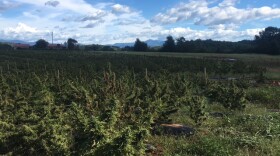Last week, a North Carolina task force commissioned by Governor Roy Cooper recommended small amounts of marijuana be decriminalized. It also says legalization should be studied. On the Qualla Boundary, the Eastern Band of Cherokee Indians is already moving forward to legalize medical marijuana.
At the end of last month, the tribal council moved forward with its own plan to bring medical marijuana to Western North Carolina. Secretary of Agriculture, Joey Owle has been working at legalize marijuana since 2015.
“I mean, we've come a long way since 2015 when it was just a small advocacy group,” said Owle.
Since then, the attitudes toward marijuana have really changed, says Owle. Six mores states legalized some form of marijuana on Election Day this month. North Carolina seems slow to join that movement but this doesn’t matter for the Eastern Band. As a sovereign nation, they have their own laws.
Owle says that talking with a member of the Paiutes in Nevada who have a recreational marijuana dispensary and tasting room really changed the way he thought about sovereignty.
“Every time we discuss having medical or recreational cannabis on our tribal land someone brings up, ‘Well, you know, the feds are going to come after us and we're going to lose funding resources.’ And he says, ‘Isn't it all federal land?,’” said Owle.
If states can legalize marijuana than there is nothing stopping Native American nations, explains Owle. In 2016, the Supreme Court upheld Colorado’s right to legalize marijuana after neighboring Nebraska and Oklahoma said it was causing them harm.
To be clear this resolution is to write a legal frame work for the first step of the Eastern Band’s medical marijuana program, says Owle.
“I appreciate Chief Sneed saying, ‘This isn't passing medical cannabis. This is the step to get us to that, to that discussion,’” said Owle.
This concept of sovereignty is also important in how gaming is run by Native American nations. Gaming is a major part of the Eastern Band’s economic machine, but the pandemic this year about has cost its two casinos about 30 percent of their revenue at this point. Medical marijuana could be a new revenue stream and bring in as much as $50 million in gross annual revenue, according to Wilson.
“It's an awesome responsibility to help shoulder some of that burden to feel responsible for helping set up these new foundations, not just for me or my kids, but you know, when we talk about seven generations, a hundred years out, where do we see ourselves?,” said Owle.
A big part of the Eastern Band’s move towards legalizing medical marijuana has been working with hemp. Like many Western North Carolina farmers, Eastern Band members took part in a 2017 pilot program to grow hemp. The program was authorized in 2014.
“It was our farmers first step to getting their fingers dirty with hemp to see what is growing was like,” said Owle. The Eastern Band then did a feasibility study on the mass production of hemp which was presented in 2019.
Owle explains that the Eastern Band has submitted a hemp regulatory plan to the USDA in October, which will give them the authority over tribal lands for regulating hemp growth. He hopes it will be approved in December and that farmers can start growing hemp on a larger scale in 2021.
However, because hemp became legalized by the federal government in 2018, the market is already saturated with the mass of CBD products and stores that we see today.
“It's hard to hold it to where it used to be during the green rush.”
That’s Jeremy Wilson, governmental affairs liaison for the Eastern Band. He was a tribal council member from 2017 to 2019. During that time, he took up the mantle for Owle to move forward with a Cannabis Commission.
“We both landed on the same page to hopefully continue the story that we were both trying to write for this tribe to allow accessibility and usage of marijuana,” said Wilson.
Wilson says that the popularity of hemp and CBD has been an important part of changing the stigma of marijuana.
“We've always believed marijuana to be this gateway drug. That it was the ‘devil's lettuce. You know, the taboo talk,” said Wilson. “That's why the sensitivity was so high back when I pushed it. And when Joey pushed it. It was just something you weren't supposed to talk about in the Southern Bible Belt.”
After back and forth with tribal government, the Cannabis Commission was started at the end of 2019. Owle and Wilson are co-chairs. During his research on marijuana, Wilson has learned a lot from tribes on the West Coast who have legalized recreational marijuana. However, for now, the Eastern Band is focusing on hemp and medical marijuana.
“We feel that medical is the right approach here. Hopefully, we can get to recreational at a point, someday,” said Wilson.
There are still a lot of hurdles to jump through, but Wilson says people could be able to use medical marijuana on the Qualla Boundary in about 18 months.





